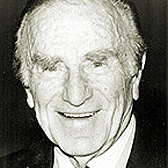Songwriter, film composer, Oscar winning film producer
Sam Coslow
InducteeFirst Broadway songwriter to be hired by Paramount in 1929
Sam Coslow was born in New York City on December 27, 1902. He attended Erasmus Hall High School and began writing songs while he was still a teenager. His first success came in 1920, with a song called "Grieving For You". He had a number of hit songs over the next few years, and contributed songs to Broadway's Artists and Models revues. Together with composer Larry Spier, he founded his own publishing company, the Spier & Coslow Music Company and in those beginning years, he also had a minor career as a performer, recording for RCA Victor, Decca and Columbia Records.
In 1929, Spier and Coslow sold their publishing firm to Paramount Pictures. Spier continued on in publishing, while Coslow signed up with Paramount as a songwriter for their movies. It was the early days of sound movies, and Coslow was the first Broadway songwriter to be hired by Paramount. During his decade with Paramount, he wrote songs for many of their films, including most of the early Bing Crosby pictures. His songs from this period include "True Blue Lou" (written in 1929 with Leo Robin and Richard Whiting for The Dance of Life); "Sing You Sinners" (1930, with W. Frank Harling, included in Honey); "Just One More Chance" (1931, with Arthur Johnston); "Thanks" and "The Day You Came Along” (both songs written with Arthur Johnston for 1933's Bing Crosby picture Too Much Harmony); "Learn To Croon" (1933, with Arthur Johnston, for a Bing Crosby film College Humor); "Cocktails For Two" (1934, with Arthur Johnston, for Murder at the Vanities); and "My Old Flame" (1934, with Arthur Johnston for a Mae West film Belle of the Nineties).
Leaving Paramount, he wrote songs briefly for MGM, including both words and music for "I'm In Love With the Honorable Mr. So And So" (1939, from Society Lawyer).
In 1940, his life took a new turn. The Mills Novelty Company of Chicago, a leading manufacturer of jukeboxes, had come up with a device to extend the concept of the jukebox into the world of film. It was called the Panoram. Coin operated, like a jukebox, it could show short three-minute music films called "soundies" on a rear projection screen. Coslow joined with Herbert Mills, of Mills Novelty, and with James Roosevelt, son of then-President Franklin Roosevelt, to found RCM Productions in order to produce soundies for the Panoram machine. By 1943, there were some 10,000 Panorams in bars, diners, and wherever else you might find a jukebox. RCM was producing at least one reel of eight soundies every week, featuring every possible type of musical entertainment with not only dancers and singers, but ice skaters, knife throwers, and more. Soundies were produced in every popular music style of the day, and many of them featured African-American performers neglected by Hollywood.
In the late 1940’s through the 50’s Coslow produced a number of films. A two-reel short film, Heavenly Music, produced by Coslow for MGM, won the Academy Award for Best Short in 1943. He also produced and wrote screenplays for full-length musical feature films, including Out of This World (1945) and Copacabana (1947). In 1954 and 1955, he lived in London, where he wrote for film and stage musicals. Coslow also collaborated with Hoagy Carmichael, Sigmund Romberg, J. Fred Coots, Fred Hollander, and Will Grosz.
Sam Coslow died in New York City on April 2, 1982.
Scroll to Discover Sam Coslow Connections



















